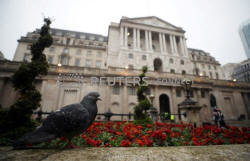Any 'yes' from BoE on negative rates is likely to be cautious
 Send a link to a friend
Send a link to a friend
 [January 29, 2021] By
Andy Bruce and Iain Withers [January 29, 2021] By
Andy Bruce and Iain Withers
LONDON (Reuters) - Heavy caveats and
caution are likely to couch any Bank of England announcement next week
that negative interest rates are technically possible in Britain,
judging from feedback from major banks.
Alongside its decisions on rates and its bond-buying programme - which
are expected to remain on hold - the BoE is due to publish on Feb. 4 the
findings of a consultation with banks on what negative rates would mean
for their operations.
The BoE has run short of firepower after cutting its Bank Rate to 0.1%
and doubling its bond stockpile to nearly 900 billion pounds ($1.23
trillion) to combat the historic economic hit of COVID-19.
So it is looking at the option of following the European Central Bank
and the Bank of Japan by using sub-zero rates.

Policymakers are divided about whether the hit to profits at Britain's
banking sector would make negative rates counterproductive for the
economy, and bankers say updating their systems to cope with a BoE minus
figure would be a challenge.
"If negative rates happened tomorrow you would see something clunky but
effective from banks, but it wouldn't be great," a senior banker said.
"Some of the systems could be adapted very quickly but not all. It is
something we take very seriously."
"The industry view is it would take up to a year to be ready
operationally," another banker said. "It's incredibly complicated to do
and nobody has really planned or budgeted for it."
Lenders in Britain make most of their profits from the difference
between the rates they charge for their lending and what they pay for
deposits.
"Negative rates would absolutely hit our business models. There's no way
we could outrun negative rates," the first banker said.
"The question is: would it finally mean charging for current accounts?
It would open the door for it. If someone does it, everyone else will
move very quickly."
HSBC said in October that rock-bottom and sub-zero rates in countries
where it operates meant it had to consider more fees.
British lenders would probably charge large corporate depositors first
and consumers as a last resort.
[to top of second column] |

A pigeon stands in front of the Bank of England in London, Britain,
April 9, 2018. Picture taken April 9, 2018. REUTERS/Hannah McKay

In Switzerland, big banks initially did not pass negative rates on to private
and smaller corporate clients. But five years on, nearly all Swiss banks have
passed on some charges to corporate and individual customers with large cash
balances.
RECOVERY PROSPECTS
Most economists polled by Reuters think the BoE is unlikely to cut rates below
zero this year, largely because the fast rollout of Britain's vaccination
programme has raised the prospect of an economic recovery. [ECILT/GB]
Divisions over negative rates among the nine members of the Monetary Policy
Committee has also made investors scale back their bets on a cut below zero.
The MPC's five internal members, headed by Governor Andrew Bailey, have stressed
risks and uncertainties.
Bailey said last week that rates close to and below zero changed the "whole
calculus of how the banking system works" and "we do not know, with any
confidence, how that would work."
The four external members sound more open to the idea.
"We had expected the BoE to reach a positive conclusion in a review to be
published next week, but Bailey's comments suggest the BoE could stall for more
time - or even say 'no for now'," said JPMorgan economist Allan Monks.
Investors are also waiting to see if the BoE speeds up the pace of its
bond-buying programme as a response to the third national coronavirus lockdown,
which is likely to lead to a cut to the BoE's forecasts for the pace of the
recovery this year.

($1 = 0.7308 pounds)
(Additional reporting by Brenna Hughes Neghaiwi and John Miller in Zurich;
Writing by Andy Bruce; Editing by William Schomberg and John Stonestreet)
[© 2021 Thomson Reuters. All rights
reserved.] Copyright 2021 Reuters. All rights reserved. This material may not be published,
broadcast, rewritten or redistributed.
Thompson Reuters is solely responsible for this content. |